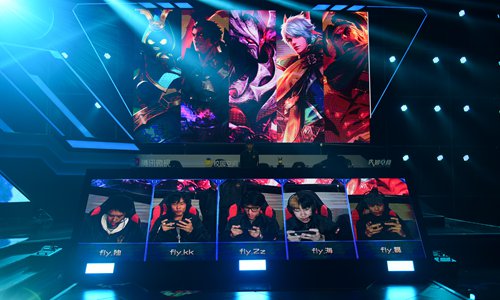
Competitors attend a national contest for mobile games in Suzhou of East China's Jiangsu Province in December 2018. (Photo: VCG)
In 2017, when Azur Lane, a Chinese game, topped the Apple App Store's best-selling game list in Japan, there was some talk among Japanese gamers that Chinese games are finally ready for the Japanese market after years of rejection due to poor graphic design.
"For a long time, Japanese (animation and gaming) products have been introduced to China, but more and more Chinese (animation and gaming) products have been launched in Japan in recent years," said Ito Naoto, counsellor of the Press and Culture Center of the Embassy of Japan in China at the Forum of Japan-China Mobile Games and Internet Culture held by the Embassy of Japan in China in December 2018.
"The international culture exchanges between Japan and China in the fields of animation, game culture and other fields are now entering a turning point," said the counsellor.
"In the era in which the mobile internet embraces rapid development, China's game market has seen fast growth and seized market share led by mobile games," Xiao Xiao told the Global Times.
Xiao is the CEO of Click Holdings, a Tokyo-based firm aiming at promoting Chinese games in the Japanese market.
A coveted market
According to a report on the development of ACG (Animation, Comics and Games) in 2018 conducted by CNG, China's official gaming association, Japan has become the third-largest but most promising market for Chinese mobile games.
Japan has the highest average revenue per user (APRU) in the world, according to Xiao. Market profits in Japan increased by 35 percent in 2017, topping the US and becoming the world's biggest market for mobile games.
Japanese players' APRU is $89.88, which is 1.5 times of the US and 2.5 times of Western Europe, according to a March 2018 report by NetEase, a leading Chinese internet technology company.
In addition, Japan is the most promising mobile game market following China and the US, with a market scale of $14 billion, and 54 million mobile game players among a 68 million-strong game-playing population, according to a report by Holdings.
Conquering Japanese players
In the first half of 2018, the Chinese mobile game Knives Out entered into Japan' top 10 best-selling games, breaking the grip that Japanese games held for years.
In the first half of 2018, Japan has become the second-largest source of revenue of Chinese games, an increase of 34 percent from last year's $310 million to $410 million, according to Xiao.
Chinese games have momentum entering overseas markets, according to a report on the Chinese game industry in 2018 released on December 21 by Beijing-based research firm GPC and CNG.
The report shows that China's independently developed online games earned $9.6 billion in revenue in 2018.
In 2018, 16 games from China were among the 100 most popular games in Japan, and 28 Chinese games were in the top 200 popular games in the country, according to Click Holdings.
Ito Naoto believes that the fast development of China's animations and games is inevitable with China's development in terms of economy and infrastructure.
Xiao told the Global Times that China's significant achievements in the e-commerce sector such as mobile business and mobile payment also contribute to Chinese games' fast growth. Additionally, China's unique internet culture also provides a strong basis for its animation and games.
The report on the Chinese game industry in 2018 points out that benefiting from high quality, original intellectual property and the developers' excellent abilities, Chinese game products are competitive and influential in the global market, especially in 2018.
Chinese game companies are actively expanding their market globally, and establishing long-term and stable cooperation with multiple overseas platforms such as Facebook and Google.
In addition, game companies also have endorsement from China's major mobile companies such as Huawei and Xiaomi, which help Chinese games expand overseas through pre-installation.
Xiao believes that a successful launch in the Japanese market requires a better understanding of the Japanese market, and a series of localization and marketing strategies.
As the Chinese old saying goes, "Know the enemy and know yourself, and you can fight a hundred battles with no danger of defeat."


